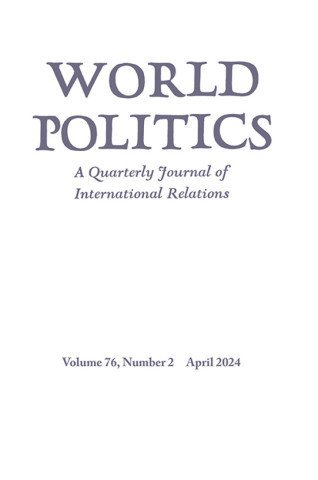外援分配中的地方党派偏见:对印度农业援助的研究
IF 2.5
1区 社会学
Q1 INTERNATIONAL RELATIONS
引用次数: 0
摘要
原则上,捐助组织对发展中国家的援助应基于需求和产生积极影响的可能性,但政治偏见可能会影响援助分配的决定。这篇文章阐述了一种理论,即为什么一种基于党派关系的特定形式的偏见会影响援助的去向以及援助目标是否实现。政党网络可以促进决策协调和利用官僚能力,但也可以确保援助等资源由两党控制,以推动连任目标。实证分析评估了世界银行对印度农业援助的地点和影响是否存在明显的党派偏见。作者分析了1995年至2008年各州议会选区和行政区援助项目、选举结果和农田覆盖率的地理参考数据。他们发现,地方立法者与管理州和国家政府的政党之间的结盟与更多的新援助项目以及农田覆盖率的异常变化有关。证据与党派偏见主要通过赞助实现政党战略目标的论点一致。本文章由计算机程序翻译,如有差异,请以英文原文为准。
Local Partisan Biases in Allocations of Foreign Aid: A Study of Agricultural Assistance in India
abstract :In principle, aid from donor organizations to developing countries should be based on need and the likelihood of positive impact, but political biases may intrude into decisions about aid allocations. This article elaborates a theory about why a particular form of bias, one based on partisan affiliations, can affect where aid goes and whether the goals of aid are met. Party networks can facilitate coordination of decisions and leverage bureaucratic capacity, but they can also ensure that resources, such as aid, stay in the control of copartisans to boost reelection goals. The empirical analysis evaluates whether partisan bias is evident in the locations and impact of World Bank agricultural aid to India. The authors analyze georeferenced data on aid projects, election results, and cropland coverage at the levels of state parliamentary electoral constituencies and administrative districts from 1995 to 2008. They find that alignment between local legislators and the political parties that govern state and national governments is associated with a greater number of new aid projects and with anomalous changes in cropland coverage. The evidence is consistent with arguments that partisan bias works primarily through patronage to achieve strategic party goals.
求助全文
通过发布文献求助,成功后即可免费获取论文全文。
去求助
来源期刊

World Politics
Multiple-
CiteScore
8.40
自引率
0.00%
发文量
24
期刊介绍:
World Politics, founded in 1948, is an internationally renowned quarterly journal of political science published in both print and online versions. Open to contributions by scholars, World Politics invites submission of research articles that make theoretical and empirical contributions to the literature, review articles, and research notes bearing on problems in international relations and comparative politics. The journal does not publish articles on current affairs, policy pieces, or narratives of a journalistic nature. Articles submitted for consideration are unsolicited, except for review articles, which are usually commissioned. Published for the Princeton Institute for International and Regional Affairs
 求助内容:
求助内容: 应助结果提醒方式:
应助结果提醒方式:


